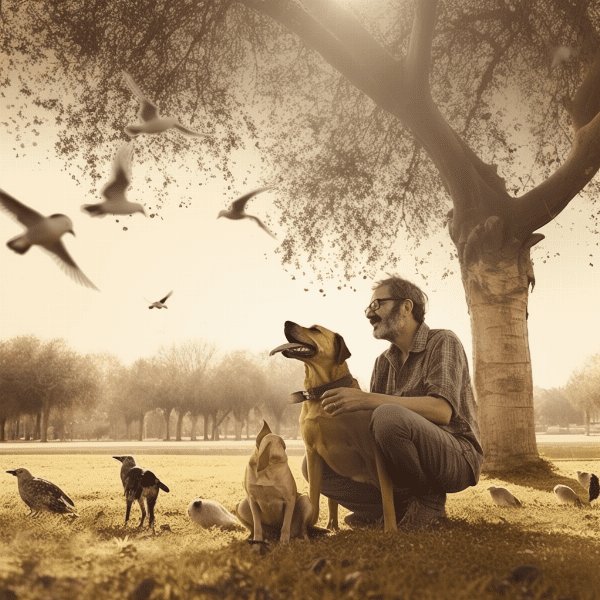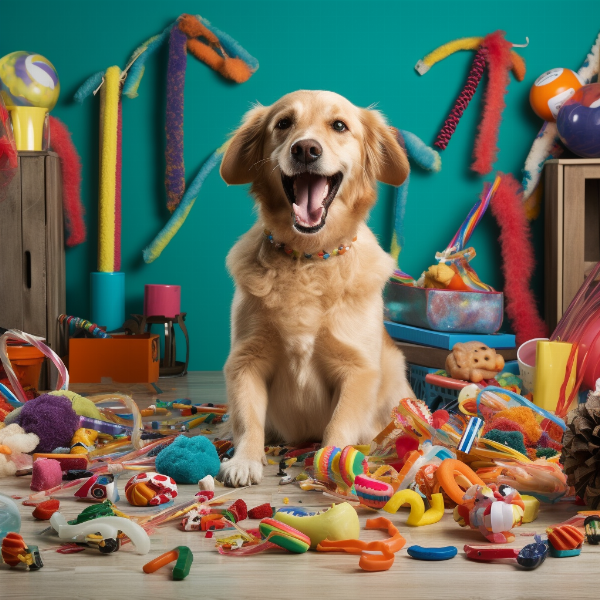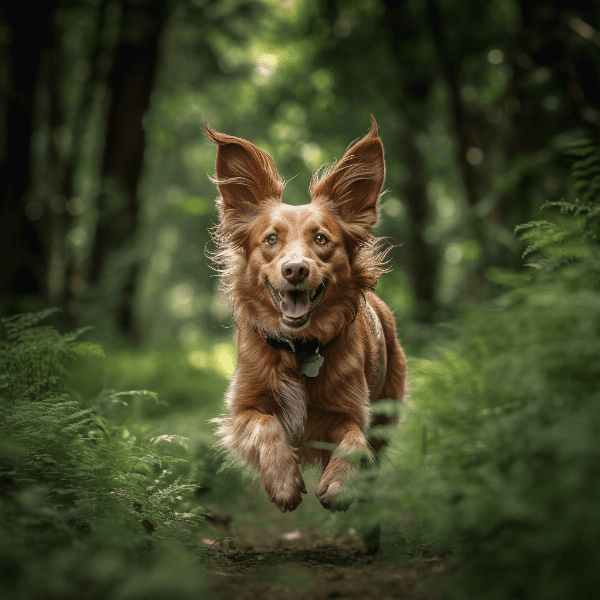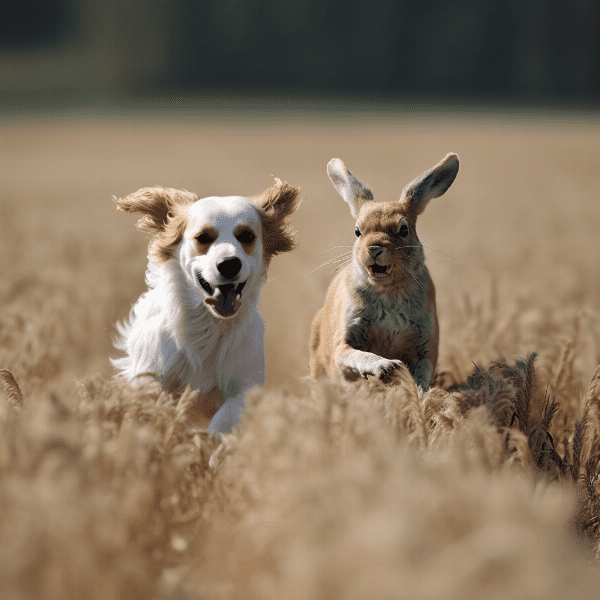Table of Contents
- Understanding Your Dog’s Instinctual Behavior
- Why Dogs Chase Birds
- The Dangers of Allowing Your Dog to Chase Birds
- Training Your Dog to Control the Urge to Chase Birds
- Alternatives to Chasing Birds for Your Dog’s Mental Stimulation
- The Importance of Exercise in Managing Your Dog’s Natural Instincts
- How to Redirect Your Dog’s Energy in a Positive Way
- The Role of Breed in a Dog’s Instinctual Behaviors
- Seeking Professional Help for Uncontrollable Chasing Behavior
- The Rewards of Owning a Well-Behaved Bird-Chasing Dog.
Understanding Your Dog’s Instinctual Behavior
As a pet owner, it’s important to understand your dog’s natural instincts, including their inclination to chase birds. Dogs have been selectively bred for different purposes, such as hunting, herding, and guarding, which have shaped their instinctual behaviors.
The Instinctual Drive to Chase
The desire to chase prey is deeply ingrained in many dog breeds, and it’s part of their predatory instincts. Dogs have a natural inclination to pursue and capture small animals, such as birds, due to their movement and high-pitched sounds, which stimulate their prey drive.
Breed Differences
The degree to which a dog will chase birds varies among breeds. Some breeds, such as Pointers, Setters, and Spaniels, were specifically bred for bird hunting and have a stronger drive to chase birds. Other breeds, such as Retrievers and Shepherds, have a less intense prey drive but may still have an inclination to chase.
The Role of Socialization and Training
While a dog’s breed and natural instincts play a significant role in their behavior, socialization and training can help to shape their behavior and control their instincts. Socialization exposes dogs to different environments, people, and animals, which can reduce their fear and aggression towards birds and other small animals.
Training can help to manage a dog’s natural instincts and redirect their behavior. Teaching your dog basic obedience commands, such as “come,” “sit,” and “stay,” can help to control their urge to chase birds. Positive reinforcement techniques, such as treats and praise, can also be used to reward your dog for good behavior.
Conclusion
Understanding your dog’s instinctual behavior is the first step in managing their natural inclinations, such as chasing birds. By recognizing their breed-specific characteristics and providing proper socialization and training, you can help to control your dog’s urge to chase and create a safe and enjoyable environment for both your dog and the birds around them.

Why Dogs Chase Birds
Dogs have an innate instinct to chase and capture prey, including birds. While some dogs may not be inclined to chase birds, many breeds have been selectively bred for hunting and have a strong drive to chase. There are several reasons why dogs chase birds.
Prey Drive
A dog’s natural inclination to chase birds is due to their prey drive. Prey drive is an instinctual behavior that is essential for a dog’s survival in the wild. This drive is triggered by certain stimuli, such as movement, sound, and scent, which stimulate a dog’s senses and activate their predatory instincts.
Stimulation and Exercise
Chasing birds can also provide dogs with physical and mental stimulation. Dogs are social animals that require regular exercise and mental stimulation to maintain their health and well-being. Chasing birds can provide a form of exercise for your dog and help to alleviate boredom and stress.
Lack of Training and Socialization
Dogs that have not received proper training and socialization may be more inclined to chase birds. Lack of training and socialization can lead to undesirable behaviors, such as chasing and aggression towards birds and other small animals.
Genetic Factors
The degree to which a dog will chase birds can also be influenced by their genetic makeup. Some breeds have been selectively bred for hunting and have a strong prey drive, which can be difficult to control without proper training and socialization.
Conclusion
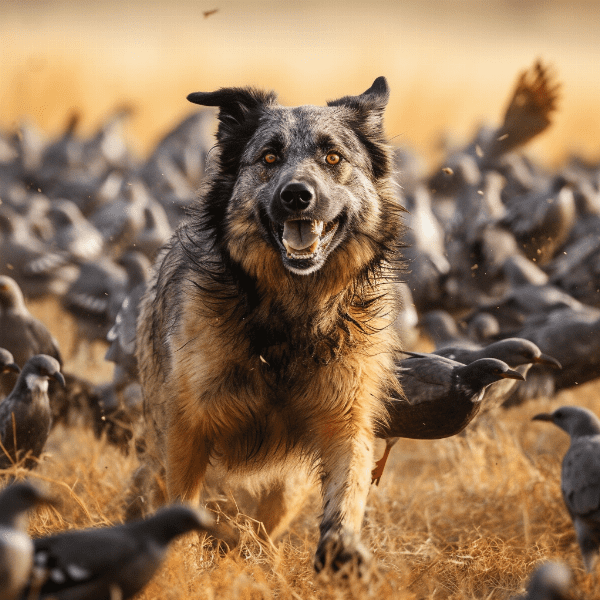
The Dangers of Allowing Your Dog to Chase Birds
Allowing your dog to chase birds can be dangerous for both your dog and the birds. While it may seem like harmless fun, chasing birds can lead to a variety of negative consequences.
Injuries to Birds
Chasing birds can cause significant injuries to the birds, including broken wings, punctured skin, and internal injuries. In some cases, the injuries may be severe enough to cause the bird’s death.
Spread of Diseases
Birds can carry a variety of diseases, some of which can be transmitted to dogs. When your dog chases birds, they can come into contact with bird droppings, feathers, and other materials that may carry harmful bacteria and viruses.
Injuries to Your Dog
Chasing birds can also be dangerous for your dog. Your dog may injure themselves while chasing birds, such as running into obstacles or getting caught in fences. Additionally, birds may defend themselves by pecking or clawing at your dog, which can cause injuries.
Legal Consequences
Chasing birds may also have legal consequences. Many birds are protected under state and federal laws, and harming or killing them can result in significant fines and penalties.
Negative Reinforcement
Allowing your dog to chase birds can also reinforce undesirable behaviors. Dogs that are allowed to chase birds may become more aggressive towards birds and other small animals, which can be difficult to control without proper training and socialization.
Conclusion
Allowing your dog to chase birds can have negative consequences for both your dog and the birds. It’s important to understand the dangers of this behavior and take appropriate steps to manage your dog’s instincts. By providing your dog with proper training, socialization, and exercise, you can help to control their urge to chase and create a safe and enjoyable environment for both your dog and the birds around them.
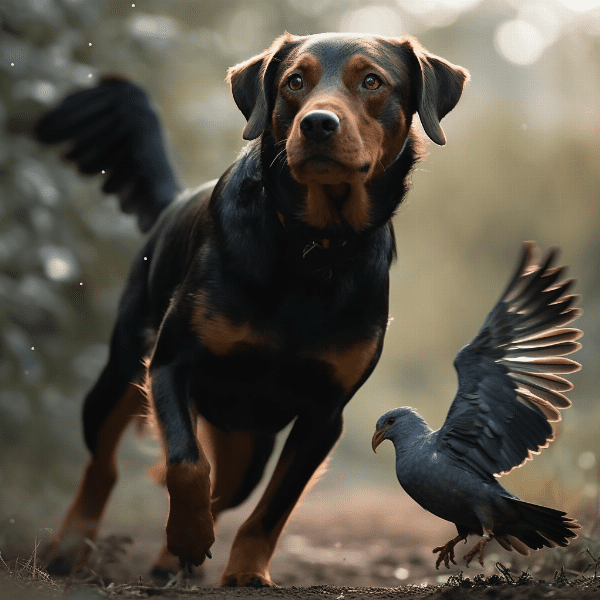
Training Your Dog to Control the Urge to Chase Birds
Training your dog to control their urge to chase birds can be a challenging but rewarding process. With patience, consistency, and positive reinforcement, you can teach your dog to redirect their instincts and focus on more appropriate behaviors.
Basic Obedience Training
The first step in controlling your dog’s urge to chase birds is to establish basic obedience training. Teaching your dog basic commands, such as “come,” “sit,” and “stay,” can help to control their behavior and redirect their attention away from birds.
Positive Reinforcement
Positive reinforcement is a powerful tool in training your dog to control their urge to chase birds. Rewarding your dog for good behavior, such as following commands or ignoring birds, can help to reinforce positive behaviors and create a strong bond between you and your dog.
Desensitization
Desensitization is a process in which your dog is exposed to birds in a controlled environment and gradually becomes accustomed to their presence. This process can help to reduce your dog’s fear and aggression towards birds and other small animals.
Controlled Environments
Training your dog to control their urge to chase birds should be done in a controlled environment, such as a fenced yard or a designated training area. This can help to prevent your dog from chasing birds in an uncontrolled setting, such as a public park or a wildlife area.
Professional Help
If your dog’s urge to chase birds is uncontrollable, seeking professional help from a dog trainer or behaviorist may be necessary. A professional can help to develop a customized training plan for your dog and provide guidance on managing their behavior.
Conclusion
Training your dog to control their urge to chase birds requires patience, consistency, and positive reinforcement. By establishing basic obedience training, using positive reinforcement, and desensitization techniques, you can help to redirect your dog’s behavior and create a safe and enjoyable environment for both your dog and the birds around them.
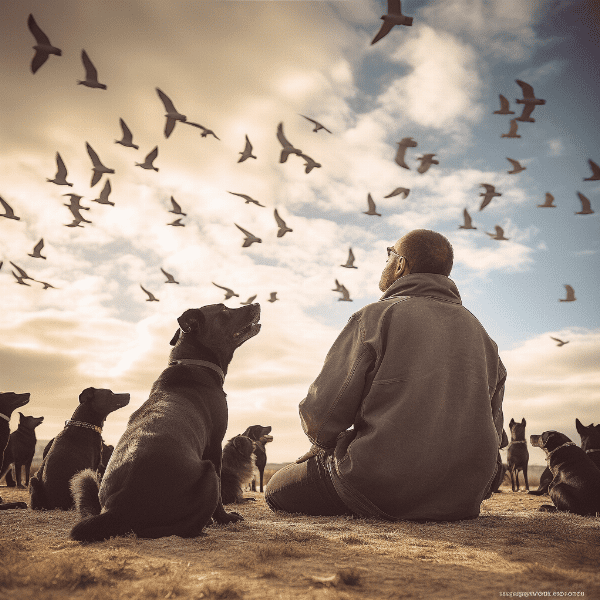
Alternatives to Chasing Birds for Your Dog’s Mental Stimulation
Chasing birds can provide your dog with physical and mental stimulation, but there are alternative activities that can provide similar benefits without the negative consequences. Here are some alternatives to consider:
Interactive Toys
Interactive toys, such as puzzle toys and treat-dispensing toys, can provide your dog with mental stimulation and encourage problem-solving skills. These toys can keep your dog entertained and mentally engaged without the need to chase birds.
Hide and Seek
Playing hide and seek with your dog can be a fun and engaging activity that provides mental stimulation. You can hide treats or toys around the house or yard and encourage your dog to find them using their sense of smell and problem-solving skills.
Fetch and Tug of War
Fetch and tug of war are classic games that provide physical exercise and mental stimulation. These games can help to strengthen the bond between you and your dog and provide an outlet for their energy.
Nose Work
Nose work is a sport that involves training your dog to use their sense of smell to locate hidden objects. This activity can provide mental stimulation and encourage problem-solving skills, without the need to chase birds.
Conclusion
There are several alternatives to chasing birds that can provide your dog with physical and mental stimulation. By providing your dog with interactive toys, agility training, hide and seek, fetch and tug of war, or nose work, you can help to redirect their behavior and create a safe and enjoyable environment for both your dog and the birds around them.
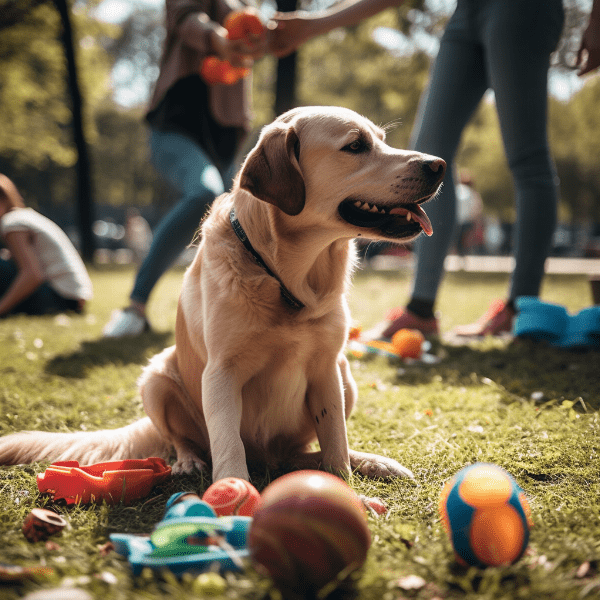
The Importance of Exercise in Managing Your Dog’s Natural Instincts
Exercise is essential for your dog’s physical and mental well-being, and it plays an important role in managing your dog’s natural instincts, such as chasing birds. Here are some reasons why exercise is important for managing your dog’s natural instincts:
Reducing Boredom and Stress
Dogs that do not receive enough exercise can become bored and stressed, which can lead to undesirable behaviors, such as chasing birds. Regular exercise can help to reduce your dog’s boredom and stress, and provide an outlet for their energy.
Increasing Bonding and Trust
Exercise can also help to strengthen the bond between you and your dog and build trust. Regular exercise together can provide a positive and enjoyable experience for both you and your dog, and create a strong sense of partnership.
Redirecting Instinctual Behaviors
Exercise can help to redirect your dog’s instinctual behaviors towards more appropriate activities. Providing your dog with physical and mental stimulation, such as agility training or nose work, can satisfy their natural instincts and reduce the urge to chase birds.
Controlling Weight and Health
Regular exercise is essential for maintaining your dog’s weight and overall health. Obesity can lead to a variety of health problems, such as joint pain and heart disease, which can impact your dog’s quality of life and increase their susceptibility to injuries.
Conclusion
Regular exercise is essential for managing your dog’s natural instincts, such as chasing birds. Exercise can provide a variety of physical and mental benefits, such as reducing boredom and stress, increasing bonding and trust, redirecting instinctual behaviors, and controlling weight and health. By providing your dog with proper exercise, you can help to create a safe and enjoyable environment for both your dog and the birds around them.
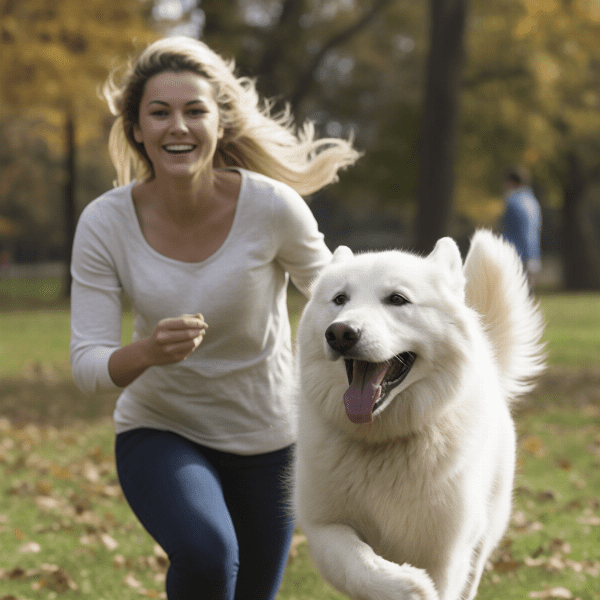
How to Redirect Your Dog’s Energy in a Positive Way
Redirecting your dog’s energy towards more positive activities can help to manage their natural instincts, such as chasing birds. Here are some tips on how to redirect your dog’s energy in a positive way:
Provide Mental Stimulation
Providing your dog with mental stimulation, such as puzzle toys or nose work, can satisfy their natural instincts and redirect their energy towards more positive activities. These activities can keep your dog mentally engaged and prevent boredom and destructive behavior.
Play Interactive Games
Playing interactive games with your dog, such as fetch, tug of war, or hide and seek, can provide physical and mental stimulation and redirect their energy towards more appropriate activities. These games can also strengthen the bond between you and your dog and provide a positive outlet for their energy.
Practice Basic Obedience Training
Practicing basic obedience training with your dog can help to control their behavior and redirect their energy towards more positive activities. Teaching your dog basic commands, such as “sit,” “stay,” and “come,” can provide structure and consistency and prevent undesirable behaviors, such as chasing birds.
Consider Agility Training
Agility training is a great way to redirect your dog’s energy towards more positive activities. Agility courses typically include obstacles, such as jumps, tunnels, and weave poles, which can challenge your dog’s physical abilities and problem-solving skills.
Engage in Regular Exercise
Regular exercise is essential for redirecting your dog’s energy towards more positive activities. Providing your dog with daily walks, runs, or playtime can reduce boredom and stress, and provide an outlet for their energy.
Conclusion
Redirecting your dog’s energy towards more positive activities is an essential part of managing their natural instincts, such as chasing birds. By providing your dog with mental stimulation, playing interactive games, practicing basic obedience training, considering agility training, and engaging in regular exercise, you can help to redirect their energy towards more appropriate behaviors and create a safe and enjoyable environment for both your dog and the birds around them.
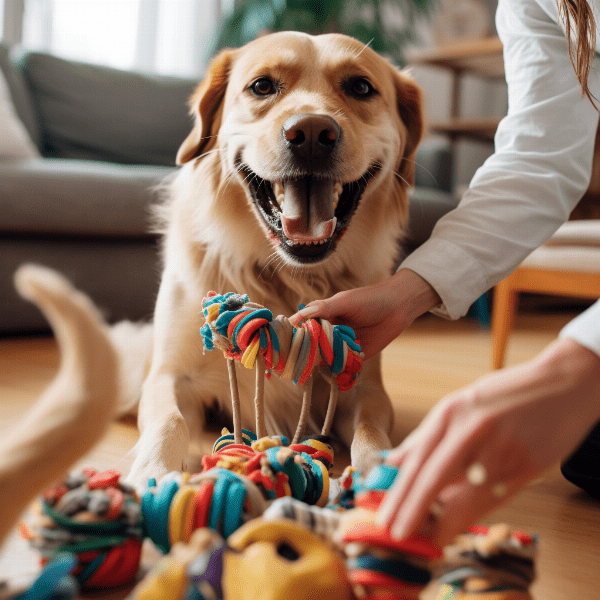
The Role of Breed in a Dog’s Instinctual Behaviors
A dog’s breed plays a significant role in their instinctual behaviors, including their inclination to chase birds. Here are some factors to consider when evaluating the role of breed in a dog’s instinctual behaviors:
History and Purpose of the Breed
The history and purpose of the breed can provide insight into their natural instincts and behaviors. For example, hunting breeds, such as Retrievers and Pointers, have been selectively bred for their ability to track and retrieve game, and may have a stronger prey drive than other breeds.
Genetics and Temperament
Genetics and temperament can also play a role in a dog’s instinctual behaviors. Dogs that are closely related to wolves, such as Huskies and Malamutes, may have a stronger prey drive due to their genetic makeup. Additionally, some breeds may have a more aggressive temperament, which can impact their behavior towards birds and other small animals.
Training and Socialization
Training and socialization can help to manage a dog’s instinctual behaviors, regardless of their breed. Proper training and socialization can help to redirect a dog’s energy towards more positive activities and prevent undesirable behaviors, such as chasing birds.
Individual Differences
It’s important to remember that each dog is unique and may exhibit different instinctual behaviors, even within the same breed. Factors such as age, gender, and individual temperament can all impact a dog’s behavior towards birds and other small animals.
Conclusion
A dog’s breed can play a significant role in their instinctual behaviors, including their inclination to chase birds. However, genetics, history, and temperament are just a few factors to consider when evaluating a dog’s behavior. Proper training, socialization, and individual differences can all impact a dog’s behavior towards birds and other small animals. By understanding the role of breed in a dog’s instinctual behaviors and taking appropriate steps to manage their behavior, you can help to create a safe and enjoyable environment for both your dog and the birds around them.

Seeking Professional Help for Uncontrollable Chasing Behavior
If your dog’s chasing behavior is uncontrollable, seeking professional help from a dog trainer or behaviorist may be necessary. Here are some reasons why seeking professional help may be necessary:
Safety Concerns
Uncontrollable chasing behavior can pose a significant safety risk to your dog and other animals. Seeking professional help can help to prevent injuries and ensure the safety of both your dog and the birds around them.
Underlying Medical Issues
Uncontrollable chasing behavior may be a symptom of an underlying medical issue, such as pain or anxiety. A professional can help to identify and address any underlying medical issues that may be contributing to your dog’s behavior.
Customized Training Plan
A professional can develop a customized training plan for your dog based on their individual needs and behavior. This plan can include specific techniques and exercises to help redirect your dog’s energy towards more positive activities and manage their chasing behavior.
Experience and Expertise
A professional dog trainer or behaviorist has experience and expertise in managing and modifying dog behavior. They can provide guidance and support throughout the training process and ensure that your dog receives the proper care and attention they need.
Conclusion
Uncontrollable chasing behavior can be dangerous for your dog and other animals. Seeking professional help from a dog trainer or behaviorist can help to address underlying medical issues, develop a customized training plan, and provide the guidance and support necessary to manage your dog’s behavior. By working with a professional, you can help to create a safe and enjoyable environment for both your dog and the birds around them.
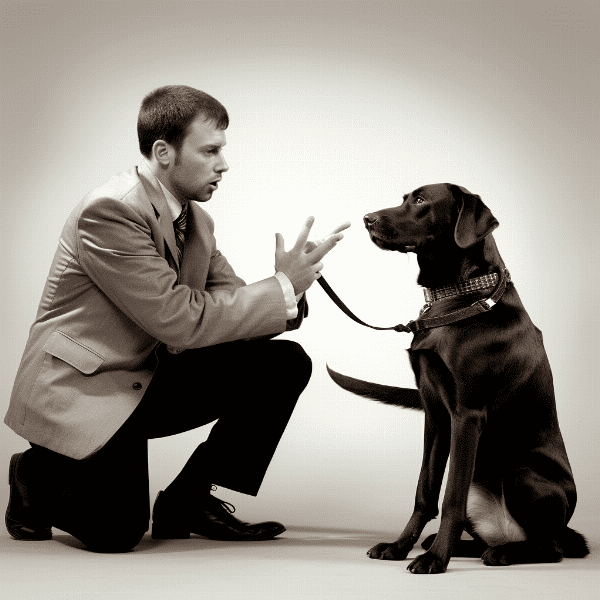
The Rewards of Owning a Well-Behaved Bird-Chasing Dog.
Managing your dog’s natural instinct to chase birds can be a challenging but rewarding experience. Here are some rewards of owning a well-behaved bird-chasing dog:
Safety and Peace of Mind
Having a well-behaved bird-chasing dog can provide peace of mind and ensure the safety of your dog and other animals. By managing your dog’s behavior, you can prevent injuries and create a safe and enjoyable environment for everyone.
Stronger Bond with Your Dog
Training and managing your dog’s behavior can strengthen the bond between you and your dog. Through positive reinforcement and consistent training, you can create a strong sense of partnership and trust with your dog.
Positive Impact on Other Animals
A well-behaved bird-chasing dog can have a positive impact on other animals, such as birds and wildlife. By managing your dog’s behavior, you can create a safe environment for these animals and help to preserve their habitats.
Better Quality of Life for Your Dog
Managing your dog’s behavior can lead to a better quality of life for your dog. By providing them with mental and physical stimulation and redirecting their energy towards positive activities, you can help to prevent boredom, stress, and other negative behaviors.
Pride in Your Accomplishments
Training and managing your dog’s behavior can be a challenging but rewarding experience. By successfully managing your dog’s behavior, you can feel a sense of pride and accomplishment in your accomplishments as a dog owner.
Conclusion
Managing your dog’s natural instinct to chase birds can be a rewarding experience for both you and your dog. By providing proper training and mental and physical stimulation, you can create a safe and enjoyable environment for everyone involved. The rewards of owning a well-behaved bird-chasing dog include safety and peace of mind, a stronger bond with your dog, a positive impact on other animals, a better quality of life for your dog, and a sense of pride and accomplishment as a dog owner.
